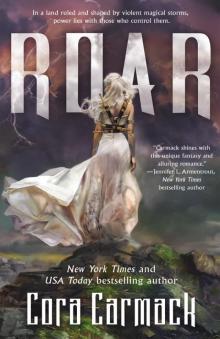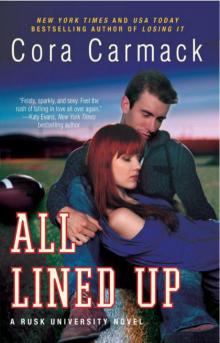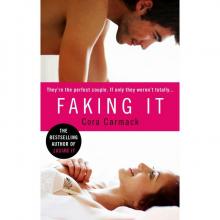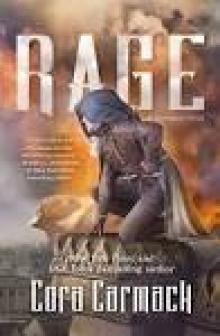- Home
- Cora Carmack
Rage--A Stormheart Novel
Rage--A Stormheart Novel Read online
Begin Reading
Table of Contents
About the Author
Copyright Page
Thank you for buying this
Tom Doherty Associates ebook.
To receive special offers, bonus content,
and info on new releases and other great reads,
sign up for our newsletters.
Or visit us online at
us.macmillan.com/newslettersignup
For email updates on the author, click here.
The author and publisher have provided this e-book to you without Digital Rights Management software (DRM) applied so that you can enjoy reading it on your personal devices. This e-book is for your personal use only. You may not print or post this e-book, or make this e-book publicly available in any way. You may not copy, reproduce, or upload this e-book, other than to read it on one of your personal devices.
Copyright infringement is against the law. If you believe the copy of this e-book you are reading infringes on the author’s copyright, please notify the publisher at: us.macmillanusa.com/piracy.
For anyone who has ever felt like they were lost in a storm, and for the people who held my hand as I walked through my own.
PROLOGUE
Thirteen Years Ago
He did not understand the day they took him from his mother.
He did not understand why the soldiers behaved so cruelly, or why his mother did not object. She only watched with tired eyes and turned away as he kicked and screamed and bit at the soldiers’ wrists to tear himself free. When he managed to break away, he ran and slid the last distance on his knees, his threadbare clothes doing little to keep his skin from scraping against the stone. He ignored the sting, and clutched at his mother’s legs, burying his face in the fabric of her skirt so he did not have to see the way she still kept her gaze from him.
Cruze had known he was not like other boys. There was no large, happy family waiting at home for him. But he had had his mother. Until the king’s soldiers peeled his scrawny arms away from her knees and dragged him away. She never looked back at him, no matter how he screamed, not even so he could memorize her face one last time.
Once his fingers were wrenched from their last hold on the doorway to the room he and his mother shared, there was no stopping the men who carried him. He was hauled down the stairs and marched outside the ramshackle building. The other women he had grown up around watched warily, but did not speak a word on his behalf, not even the kind ones who had offered him refuge in their rooms while his mother worked. They watched from their doorways and windows as he was shoved into the back of a wooden wagon. The soldier threw him, and he landed on his side, his hip striking painfully against the floor of the cart. Before he could regain his footing, they slammed and barred a wooden door, locking him away in the darkness.
He beat at the door. Even once he felt the cart jerk and the horses began to move, he rained fury upon the wood with his fists, shouting for his mother, as though she might still hear him as he moved farther and farther away. And when that did not work, and his voice began to grow hoarse, he broke and he shouted his father’s name too. Even though it was not a name he was ever supposed to say aloud.
His sire did not come either. And the wagon kept going and going, long past the time his voice gave out and he had only his fists with which to speak.
“Enough,” a soft voice said, floating toward him from somewhere in the darkness. “You have hurt yourself enough.”
He stood quickly, and spun to plant his back against the door.
“Who’s there?”
There was shuffling in the darkness. “Someone like you.”
It sounded like a girl. A scoff curled in his throat and he said, “I doubt that.”
“We’re locked in the same cart, aren’t we? That’s one thing in common. And I can promise there’s at least one more thing that makes us alike. Neither of us are ever going back to the lives we had before.”
The boy absorbed that knowledge. It was a reasonable conclusion, especially given the soldiers and his mother’s reaction. He thought he ought to be more sad to have lost his whole life. But he had always thought it was a rather abysmal life anyway. His mother rarely let him leave their small one-room home. There were no other boys or girls around to play. His father used to visit on occasion when Cruze was younger, but he had stopped coming several years ago. And if not even his mother had cared to keep him, why should he care to stay?
“Maybe we’ll have better lives,” he insisted.
The darkness stilled around him, and the girl did not reply. After a while, he realized that was her answer. His fists had begun to throb, so he slumped down on the floor and cradled them carefully in his lap. Gradually, the gentle sway of the wagon lowered his defenses, and sleep helped him forget the pain.
He was shocked awake sometime later when the doors were opened and another boy, this one even younger than he, was tossed inside. The boy cried for his father all the while, his eyes red, and his nose running freely, pathetically. “Papa, papa, papa,” the boy wailed—his cries a chorus that swelled inside the small wagon, no matter how small the boy’s voice grew. Cruze wondered if he had looked that pitiful. In the brief wash of sunlight before the doors crashed closed again, he saw the girl—she was a year or two older than him with dark, unwashed hair, haunted eyes, and a horrible purple-red mark around her throat that made the wounds on his fists look like child’s play. Their eyes met, and he knew for certain that wherever he was being taken, it was not somewhere better.
By the time they reached their destination, there were eleven other children crammed into the wagon. He and the girl ended up side by side. The stench of dirt and sweat collected around them and the trip seemed to go on forever and ever.
After a while, the girl leaned over and whispered, “What got you here?”
His brows furrowed and his lips pursed. “How should I know?”
“You don’t have to pretend. Everybody here is like us. It’s why we were all taken.”
“Like us?” Cruze asked.
She shifted in the dark, and he was not sure how, but he knew she was tracing that line on her throat. He wanted to ask how it had happened, but he could not push the words off his tongue.
“We’re all … different,” the girl whispered into the slim space between them.
Cruze thought that over for a moment. He had never been normal, that much was certain. But he’d always assumed that had far more to do with his bloodlines than anything else.
“Who are your parents?” he asked the girl.
“It does not matter.”
Then what did matter? Why had they all been taken?
He did not get an answer. Not when the wagon finally stopped what felt like hours later. Not when the children were dumped out into wild, jungle terrain and held back at sword-point when they tried to move. Two soldiers kept them controlled by fear, while two others barred the doors of the now empty wagon. Within a few breaths, the soldiers had loaded into the wagon and given the horses a hard whip that set them off at a gallop.
Some of the children ran after them, wailing and weeping, falling quickly behind, and losing them completely when the wagon turned around the first bend. But Cruze stayed behind, surveying their surroundings. They were near a river; the soldiers had done them that courtesy at least. But there was little in the way of shelter or protection. The leaves and vines were so thick on the trees overhead that they blocked out most of the sky, making it difficult to determine where the sun hung overhead, or if it did at all. They had to be far, far away from the city. Not even the great looming castle that sat atop the gloomy ocean-battered cliffs could be seen from wherever the soldiers had left them.
He set about exploring, mostly so none of the others would see the way his eyes turned red, and his lip shook with every breath in and out.
“This is better,” Cruze told himself. He would make a better life for himself. He could. He might have lost his mother and his father and what little home he had. But he had his wits, his strength, and he had the goddess. His father, before he had stopped visiting, had always told Cruze he was goddess-blessed.
And the goddess would protect him now. He believed it.
He had to.
Because as he climbed up a tree in order to kick down a few coconuts for the group to share, he realized it was not the canopy that blocked out the sun overhead. It was a storm. Dark clouds unfurled like the wings of some beast of the night, and he heard it roar on the wind. Cruze did not know how, but when he looked on that tempest something in it seemed to look back at him. Icy awareness trailed up his spine and then he heard a voice—not in his mind, nor in his heart, but everywhere in him and nowhere all at once.
“Destroy,” it whispered. “Death. Decay.” Again and again, the words took up residence inside him. “Destroy. Death. Decay. This is the will of the goddess.”
“Did you say something?” a voice called out below, jerking his attention away from the clouds.
The girl hovered below him, her arms full of the coconuts he had already freed, clearly waiting for more.
“What?” he asked.
“Did you say something about the goddess?”
Cruze’s mouth went dry, and he refused to raise his eyes again to the storm overhead. Instead, he slid carelessly down the tree, earning what would prove to be several monstrous bruises later, no doubt.
When his feet met solid earth, he looked at the girl and said, “There’s a storm coming. We need to find shelter, or we die.”
From that point on, the seasons changed. The bounds of winter could not be controlled, nor could the hope of spring always break through. There was merely the time when the storms slumbered, and the time when they raged.
—The Time of Tempests
1
Sweat gathered along the back of Aurora’s neck as she followed her fellow storm hunters through the swaths of people to the growing settlement that edged the city of Pavan. The air hung heavy with impending rain, but that was not what made Aurora struggle to pull in a breath.
It was the souls.
They assailed her from every direction—they pulled at her from the earth, laying invisible tangles for her feet, and pressed at her from the air, prickling over her skin. Overlapping whispers clashed with louder bellows and pleas to form a cacophony that ground nearly all her thoughts to a stop. It was difficult to discern the difference between the crowd of living people around her and the swarm of spirits that came with them, but she knew it was not normal for this many unsettled souls to gather in one place.
Either a great many people had died here in recent weeks, or these souls had followed their surviving loved ones here after they fled their destroyed homes as remnants. Perhaps it was a combination of the two.
The remnant camp clung to the exterior walls of the city of Pavan like a wounded arm bandaged close to the body. This place felt wounded too. It was in the air, in the earth, in the creeping puddles of water that made mud of the places where people had done their best to create homes from whatever they could salvage. Aurora felt the spirits of the dead most clearly, but in the last few weeks her ability to sense living souls had grown as well. The desolation here had a taste, a bitterness that she did not even have to search for. It was there every time she opened her mouth to breathe.
People had made tents and lean-tos from whatever materials they could scavenge. Ripped and patched blankets passed for roofs in places, while mismatched pieces of wood, tied together with string or torn fabric, were the nearest thing to walls. Most hadn’t bothered with walls, opting instead to focus on sheltering themselves from the sky as much as possible, but Aurora knew with certainty that none of these structures would hold up in a storm. In fact, she had the feeling that this little community had been rebuilt on its own bones more than a few times. There was more despair in this place than any one patch of land should ever lay claim to; that it was in a place she used to call home shredded something inside her.
“Roar?”
She pulled her gaze away from the remnants, and found the deep brown eyes of the man who had followed her across the wildlands without a word of complaint, no matter that she had yet to tell him why. She had yet to tell him so many things, and her heart clenched at the uncertainty of what would happen when she did. Would he still be willing to follow her anywhere when he knew how many lies she had told?
Kiran, the man she had first known as Locke, stopped where he had been walking ahead of her, backtracking until he stood in front of her. “You do not look well,” he said.
She did not feel it either, but he was tense enough already; the last thing she needed was to trigger one of his overprotective fits. “Such flattery. Stop before I swoon.”
Kiran’s dark eyebrows flattened into fierce lines, but the straight press of his lips twitched up on one side, cracking the otherwise gruff mask he wore. He stood firm for a few moments more, then he dropped his folded arms, his shoulders softening into an arch as he bent down to graze his lips across her temple before dropping lower, to her ear. He whispered, “Do you want me to flatter you, princess?” The question was a low rumble that sent shivers across her skin.
Skies, his obsession with that nickname would be the death of her. It produced the most bizarre mix of nostalgia for their time together in the wildlands and festering guilt for the truth she had yet to tell him—that she truly was a princess, or at least she had been, before she had left Pavan at the mercy of its enemies. Now she was not sure what she was. Did it matter that she was a princess if her kingdom had fallen to another?
He stepped to her side, offering his elbow, and Aurora took it gratefully. She tried not to lean too much on him as they walked, reluctant to give away her discomfort, but she was nonetheless relieved to have him strong and steady by her side. “A man does have a lot of time to think while traveling for days on end,” he continued, his voice a low murmur. “So if you did want some flattery, I have had ample preparation time to think about all my favorite aspects of your character.”
“My character?” Aurora asked.
“Among other things.” He shot her the most mischievous grin. Her cheeks flushed with heat, and she tried to laugh it off, but at that moment they approached a particularly populated area of the camp, and the crush of souls made the air close off in her throat.
She clutched Kiran’s forearm, her nails digging in harder than she intended. Immediately, he jerked to a stop, pulling her to fully face him. “I knew something was wrong,” he hissed. “What is it?”
Aurora took a few hard blinks, trying to focus, and scraped in a raspy breath, followed by another. She did not know how to explain to him the way it felt to be this surrounded, this inundated. She imagined it to be like swimming deep into the ocean, the heavy pressure of the water pushing at her lungs and her ears harder and harder until they felt as if they might burst. No, no, that was not quite right. It was more like sensory overload, as if her sense of hearing had increased, and now everything was too loud, too close. Only what she sensed was so much more complex than sound, or sight, or smell.
She felt … yearning and regret and wave upon wave of hopelessness. She saw fragments of memories and lives and loves. Spirits, new ones especially, had a tendency to dwell on their passing, so again and again and again she plunged into the misery of their deaths, dragged unwillingly along for the ride. Even when she managed to put up a block, there was such painful energy here that it made her feel raw and worn out. Which left her with too little strength to block the other souls she could feel—the ones that were not grieving or coping or following loved ones—the ones that had long ago let go of their human lives and become something else entirely. Mangled by fu
ry and knotted up in lust for power and revenge, these souls were not as close by, but it did not matter. Their presence loomed so large and dark and magnetic—she knew if she dared to use her power to call a storm now, it would be one of those souls that would answer. She was not sure she would be able to stop them.
“Roar. Answer me, or I am going to make a scene.”
No. They absolutely could not draw attention to themselves. She had noted on their arrival the blue Locke flags that now flew atop Pavan’s city walls. But it was not only flags that enforced the change in rule; Locke soldiers stood on guard at the gates and occasionally made sweeps through the camp. She had yet to recognize anyone she knew, but that did not mean they would not recognize her if they saw her.
“I am fine. Only…” She cleared her throat, knowing she had to give him something or he would never give up. “You remember Avira?” she asked, referencing the spirit witch he had sought out when Aurora had taken the heart of a skyfire storm in the Sangsorra desert and fallen unconscious for days. That night in the desert, she had manifested the incredibly rare ability to take the heart of a storm not by the traditional means of defeating the storm to capture the relic Stormheart it leaves behind, but by literally taking the storm into herself. Kiran did not talk about it much, but she knew that night had been traumatizing for him, not to mention her remaining unconscious for days with a mimicry of a lightning storm where her heart should be. It was a wonder he had not run for the hills before now.
“Of course I remember her. She gave me back my name.” He squeezed her arm gently and grimaced. “And I will never forget the way she was always looking around, as if she was having ten different conversations I could not hear. It was unsettling.”
Aurora fought not to wince, and in her fatigue just ended up giving a long, slow blink.
“Roar?”
She forced heavy-lidded eyes open, suddenly exhausted. “Hmm?”

 All Played Out
All Played Out Finding It
Finding It Roar
Roar Losing It
Losing It All Broke Down
All Broke Down All Lined Up
All Lined Up Faking It
Faking It Seeking Her
Seeking Her Inspire
Inspire The Cora Carmack Box Set
The Cora Carmack Box Set Keeping Her
Keeping Her The Cora Carmack New Adult Boxed Set: Losing It, Keeping Her, Faking It, and Finding It plus bonus material
The Cora Carmack New Adult Boxed Set: Losing It, Keeping Her, Faking It, and Finding It plus bonus material All Broke Down (Rusk University #2)
All Broke Down (Rusk University #2) Rage--A Stormheart Novel
Rage--A Stormheart Novel All Played Out (Rusk University #3)
All Played Out (Rusk University #3) Finding It li-3
Finding It li-3 Keeping Her (losing it)
Keeping Her (losing it)